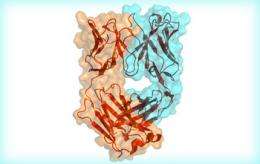Neutralizing HIV

Each time a virus invades a healthy individual, antibodies created by the body fight to fend off the intruders. For some viruses, like HIV, the antibodies are very specific and are generated too slowly to combat the rapidly changing virus. However, in the past few years, scientists have found that some HIV-positive people develop highly potent antibodies that can neutralize different subtypes of the HIV virus.
Now, a study involving researchers at Caltech points to the possibility of using these neutralizing antibodies in the development of a vaccine. The paper, published in the July 14 issue of Science Express, describes a group of novel antibodies that were isolated from HIV-infected individuals using a new cloning approach.
These antibodies are the most potent anti-HIV antibodies targeting the CD4 binding site— a functional site on the surface of HIV needed for cell entry and infection—that have ever been identified, says Ron Diskin, a post-doctoral scholar at Caltech who worked on the paper. David Ho (BS '74), scientific director of the Aaron Diamond AIDS Research Center in New York, also contributed to the study, which was led by researchers at Rockefeller University.
At Caltech, the researchers conducted structural studies and were able to show, based on similarity to a previously known antibody (VRC01), that the new antibodies indeed target the CD4 receptor binding site. CD4 positive cells are the point of HIV infection and where the virus multiplies.
This study is important for several different reasons, according to Diskin. "First, it provides extremely useful reagents that can be used for passive immunization to treat infected individuals," he says. "Second, it demonstrates that a comparable and highly effective anti-HIV immune response was elicited in different individuals, which strongly supports the idea that an effective vaccine will be feasible to develop."
Next, researchers at Caltech will address the structural mechanisms that make those antibodies so potent. In fact, they are currently investigating those structural aspects of the neutralization mechanisms.
"We're very excited to have the opportunity to use structural biology to learn what makes these new antibodies so potent against HIV," says Pamela Bjorkman, Caltech's Delbruck Professor of Biology and a co-author of the study. "We hope that visualizing how these antibodies interact with HIV proteins will allow the design of even more potent anti-HIV reagents and provide critical information for vaccine design."
















